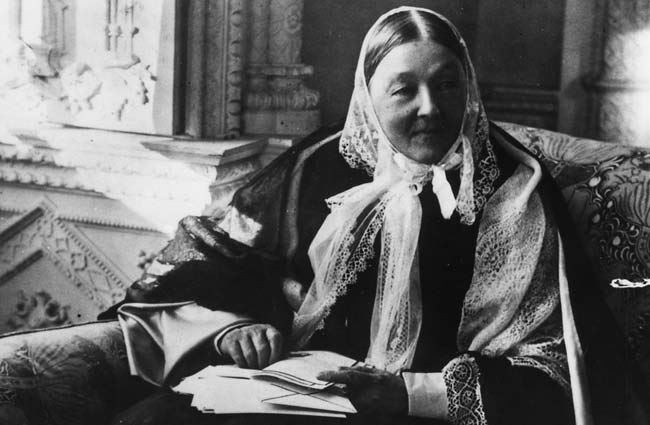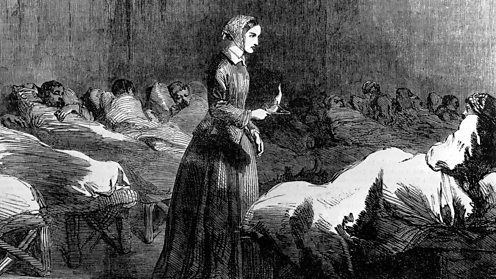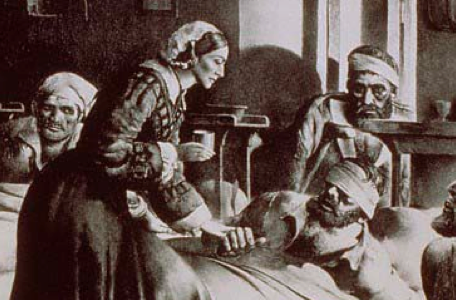 |
| (http://historythings.com/florence-nightingale-lady ()) |
A drop of sweat runs down a man's forehead, the only sound being heard from him is heavy breathing. Suddenly, the breathing turns faster and faster, the squeaks of his vocal chords flapping together becoming more apparent, and then stopping. "That's the 10th one this hour," the nurse sighs. She takes a white sheet covered in dirt and blood and covers the man's body, then tying rope to secure it. Seconds after, flies are buzzing around the body, the smells becoming apparent. During the Crimean War, these conditions were a reality for many soldiers. Proper medical and health measures that modern hospitals today were not even thought about back then. That is, until Florence Nightingale entered the nursing scene. Florence Nightingale was born on May 12, 1820. As Nightingale progressed throughout her career, she served as an inspiration to others. Nightingale's passion fueled her from a young age to pursue nursing, even as it was a disrespected profession at the time. As time progressed, her dedication allowed her to push through what was thought possible, and to elevate the status of nursing. Florence Nightingale paved the road of modern medicine by dedicating her life to improve the sanitary conditions of patients, and preserving her undying passion for nursing by passing it to the new generation.
Florence Nightingale, passionate from a young age, pursued a field of medicine that would be unthinkable to others, and became a leading figure in nursing even today. From a young age, Nightingale showed signs of wanting to become a nurse. As she could finally see the light of her career, an obstacle appeared in her path. ¨When in her mid-twenties she announced her plans to become a nurse, her mother and sister were both horrified and hysterical, and her father, wary of family tensions, wrestled with ambivalence. His lack of outright approval sealed her resentment for him and drove her to the self-destructive fervor that characterized her work" ("Florence Nightingale"). When she announced to her family that she wanted to pursue a nursing career, they disapproved heavily. However, she didn't lose hope. Even when her family disapproved of her dreams, she still pushed through and her passion fueled her to continue and follow her dreams. At the peak of Nightingale's career, she was sent to work as a nurse in the Crimean War. ¨In May 1855 Florence Nightingale crossed to the Crimea to inspect the war hospitals, and while there collapsed and was dangerously ill with 'Crimean fever', which she referred to as 'typhus' but which was probably Brucella melinites, or perhaps Brucella melitensis (D. A. B. Young, BMJ, 23 Dec 1995, vol. 311). Nightingale made a slow and painful recovery. She resisted efforts by officials to ship her home and returned to Scutari to continue working; in all she made three inspections of the Crimea, and on Good Friday 1856 she was given full jurisdiction over 'the East' (Smith, 63)" (Baly). Even with an illness herself, she continues to keep going, and her passion fueled her to continue to strive for the health and happiness of her patients. However, that wasn't enough for Nightingale. She eventually went on to advocate for sanitary laws in villages and towns. In a speech that she gave known as, "On the State of Rural Hygiene," she called for villagers to take action to these problems before it became a serious issue. " We wait to see whether the filth will really trickle into the well, and whether the foul water really will poison the family, and how many will die of it. And then, when enough have died, we think it time to spend some money and some trouble to stop the murders going further, and we enter the results of our "masterly inactivity" neatly in tables; but we do not analyse and tabulate the saddened lives of those who remain, and the desolate homes in our "sanitary districts." Nightingale, seeing what tragedies have occurred on the battlefield, saw similar events happening in rural villages. Her passion for nursing evolved into teaching the people to take care of their environments, and to take action sooner than later to prevent further tragedies. Nightingale was one of the first people to advocate for this right, and helped relay the message for decades. Nightingale's passion for her patients and the career she rebelled so hard to choose kept getting stronger as years passed. Eventually, her passion translated into dedication to make sure that the art of nursing was not forgotten.
 |
| (http://www.bbc.co.uk/timelines/z92hsbk ()) |
As Nightingale's dedication for nursing kept growing stronger and stronger, it helped to propel her in the path of continuing the nursing profession, and making sure that the progress and respect that it had gained had not been forgotten, but remembered and continued to improve as the years went by. As Nightingale arrived in the Crimean War, she quickly realized that more patients were dying because of poor medical care than dying on the field. So, in order to counterattack that, she made some serious changes in the way that the facility was run. "Nightingale took firm administrative measures, set up sanitary kitchen and laundry facilities, and procured supplies with private funds. The death rate fell from 42.7 percent to 2.2 percent in six months. An international heroine at age thirty-six, Nightingale was immortalized by Henry Wadsworth Longfellow, as "a lady with a lamp" making her nightly rounds on the hospital wards, in his 1857 poem "Santa Filomena."" (Mike). As Nightingale was in the Crimean War, she noticed many more casualties from harmful nursing as opposed to wounds from the actual war. Using her knowledge from her nursing school days, she was successfully able to use sanitary measures to protect more and more lives from death in the war. This shows her dedication because she took the time and effort to care for her patients. After the Crimean War, was over, Nightingale was appointed as the Superintendent of Nurses. At this time, she sought to expand the nursing field, and to encourage young women to pursue this career. "At the same time she persuaded the fund council to divert money for a training scheme for nurses based at the Highgate Poor Law Infirmary, and later, in 1881, more successfully, for a team of Nightingale nurses at the St Marylebone Institute, thus laying the foundation for trained nursing in the new municipal hospitals after the 'Local Government Act' (1888)¨ (Baly). Nightingale was not only passionate about her career, but she also wanted to help others learn and perfect the profession to the best of their ability. Her dedication showed that she wanted nursing to continue to grow. Her passing this law shows that she wanted this job to continue and prosper throughout the years. As Nightingale approached her later years, she went into advocating for social issues. As stated before, she was very invested into ensuring the sanitary conditions of villages. "And if the Community is advantaged, the Community should pay for that advantage. The gain is a double one-safety in the matter of health, increase in the matter of food, besides the untold gain, moral as well as material, which results from the successful cultivation of land" ("On the State of Rural Hygiene" para. 28). When Florence Nightingale speaks of the benefits of being more clean, she shows her passion of serving the people. This shows that even as an ordinary person, she is able to go to extreme measure to make sure that the people that she isn't even acquainted with get the best future that they can. This shows her heroism as she fights to change the system that is clearly doing more damage than good. Florence Nightingale used her passion and dedication to change the planet drastically, helping make many important discoveries that are still used today, and helping the old world evolve into the modern world that is today.
 |
| (http://www.britainfirst.org/florence-nightingale-t ()) |
Florence Nightingale used her dedication to bring the necessary changes needed in the nursing profession, and used her passion for nursing to pass the discoveries that she made to the people who followed in her footsteps. Her dedication to nursing began when she was young, and didn't leave all throughout her life. She never rested doing what she loved, and her passion for her profession was unstoppable. Even as she was sick and old, she still contributed to help humanity. "Throughout her life she provided advice on a variety of health care issues to associates all over the globe. Though ill and bedridden for much of her later life, Nightingale managed to continue her great work through correspondence" ("The Life of Florence Nightingale"). Even as she grew older, she still worked hard and left her footprint on humanity's achievements through the years. Nightingale also became one of the first women to push for feminism. ¨She was an early campaigner for women's rights, particularly their right to property, and she inveighed against the limitations imposed on educated women undertaking worthwhile and paid work¨ (Baly para. 30). Florence Nightingale helped push women to the forefront, and also helped break gender stereotypes that were set at the time. I was also personally inspired by her dedication and passion, which showed me that I could be strong too. Thanks to Nightingale's influence and hard work throughout her life, she contributed to many of the discoveries that were going to be essential to medical care. Her lifetime of dedication and passion has left us with tools to make sure that people like that soldier never have to experience those harsh conditions again.
Works Cited Baly, Monica E. and H. C. G. Matthew. "Nightingale, Florence 1820 - 1910." Oxford Dictionary of National Biography, Jan. 2010, p. 1. EBSCOhost, search.ebscohost.com/login.aspx?direct=true&db=b6h&AN=51817162&site=brc-live. "Florence Nightingale." Gay & Lesbian Biography, edited by Michael J. Tyrkus and Michael Bronski, St. James Press, 1997. Biography in Context, link.galegroup.com/apps/doc/K1634000200/BIC1?u=powa9245&xid=49b40d5d. Accessed 28 Apr. 2017. Miké, Valerie. "Florence Nightingale." Encyclopedia of Science, Technology, and Ethics, edited by Carl Mitcham, Macmillan Reference USA, 2005. Biography in Context, link.galegroup.com/apps/doc/K3434900464/BIC1?u=powa9245&xid=744963ec. Accessed 27 Apr. 2017. "On the State of Rural Hygiene." Medicine, Health, and Bioethics: Essential Primary Sources, edited by K. Lee Lerner and Brenda Wilmoth Lerner, Gale, 2006, pp. 287-291. Biography in Context, link.galegroup.com/apps/doc/CX3456500112/BIC1?u=powa9245&xid=957a8c84. Accessed 2 May 2017. "The Life of Florence Nightingale." Reynolds-Finley Historical Library, University of Alabama Birmingham, 2011, Web. https://www.uab.edu/reynolds/nightingale/life, Accessed 1 May, 2017
Page created on 6/1/2017 12:00:00 AM
Last edited 6/1/2017 12:00:00 AM
